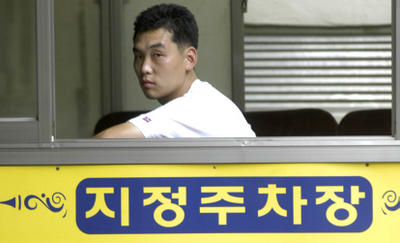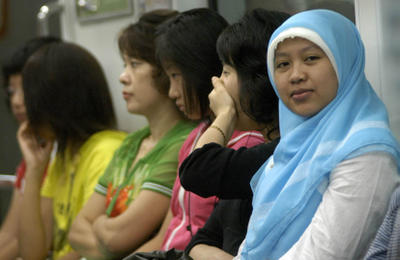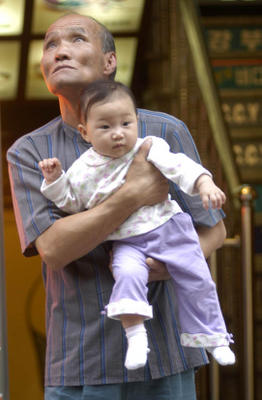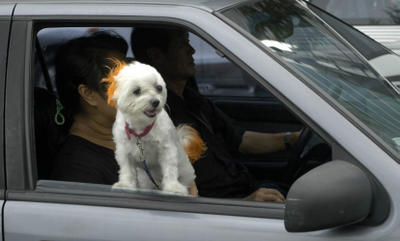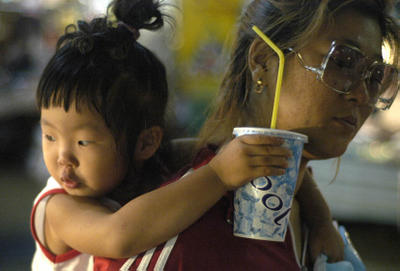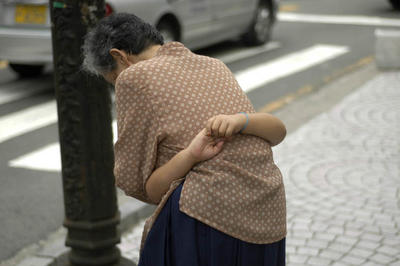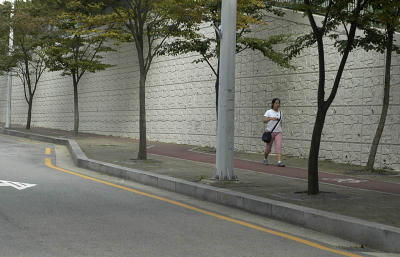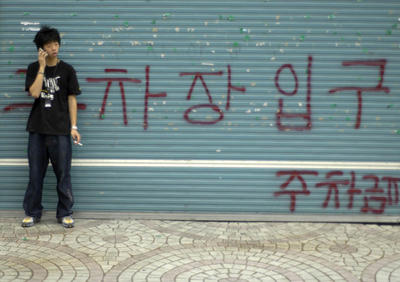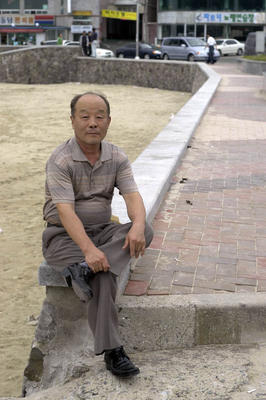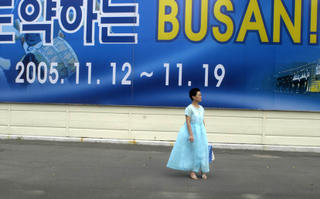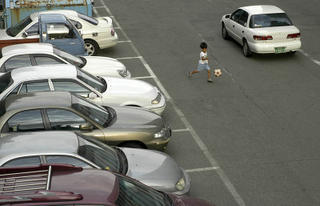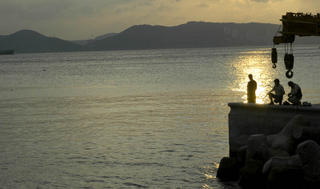It's 3:30. I've got five minutes. I pop two 100-won coins in the coffee machine and choke down the half-cup of syrupy liquid. My eyes pop open and my heart races as the chemicals take hold.
Rollbook, teaching materials and chalk in hand, I walk slowly towards room 309 at the end of the hall. The hallways is packed with people. Mothers fill the chairs lining the hallway. Korean teachers pass by, they're arms filled with notebooks. Screaming, laughing children surge down the hallway in both directions, pausing only to gawk at their caffeine-addled American babysitter (me). A few brave souls stumble over a vowel-ridden "hallllooooo teachah, howa you?" I nod.
It's hard not to think of oneself in the third person when walking to a classroom full of hyper ten-year-olds who don't speak your language. I'm not Stephen Jones walking down a hallway crammed with students. I'm Daniel being cast into the lions' den. I'm Paris marching out to face Achilles. I'm a Parisian revolutionary convicted of asking for my piece of cake.
The sound of the children dies down and the hallway fades away. People throw rotten fruit and stones at me as I am lead by chains to the gallows. Somewhere in the distance a lone snare drum organizes the silence into a sharp staccato roll. The Grand Inquizitor approaches me as the executioner fits my neck with a prickly noose.
"Does the convicted have any last words?" he asks snobbishly.
"Why yes sir, I do," I say as I enter room 309. "CLASS! STAND UP!"
The kids weren't too bad today. I tried a new trick to learn their names. I brought a styrofoam ball and tossed it to each child as I called their names. Once caught, they threw it back and repeated the name so that I could hear it spoken in it's native tongue.
I'm still far from perfect at pronouncing Korean names. How do you think "Seob" sounds? Here's a clue: Not a thing like it's written.
"Yoon-seob!" I call out.
"Noooooah teachah! Noooooah!" Ah, Yoon-seob is here. The seven-year-old boy crosses his arms in front of his face and shakes it at me. No, bad, wrong, try again.
"How do I pronounce?" I ask sheepishly. "Yoon-seeop?" The boy's eyes widden even further and the arms go up again.
"Nooooah! Nooooah! Yoon-Sop!"
"Yoon-Soop?"
"Noooooah! Yoon-SOP!" He emphasizes the end of the name, making it even harder to understand. I try again.
"Yoon-Soup?"
"Yoon-SOP!"
"Sup?"
"SOP!!!"
"Sopp?"
The child hangs his head as if to underscore my complete failure at pronouncing Hangul. Frustrated, I move on to the next child, amazed to see that five minutes of my twenty minute class is gone forever.
"Tae-eun?" I say and look up.
"Noooooah, teachah! Noooooahhh!" A little girl stands up and crosses her arms at me. Ah, Tae-eun is here, too. It literally took all twenty minutes of my first class with the 1-2Ps simply to call roll.
Tomorrow I have to wake up at the crack of dawn to catch a bus down to the Red Cross and listen catch a seminar on "proper behavior while living in Korea" by the Alien Registration Bureau. According to Ha-young, our teacher coordinator, every single registered alien in all of Busan is required by law to be there for the entire three-hour duration. That is going to eat most of my free time tomorrow, which sucks. Lately the time I keep for myself has become a precious commodity.
My co-workers cornered Ha-young in the teachers' office and demanded to know why they had less than a day's warning for the seminar. Mike was particularly irked, demanding to know why he has go when he only has a week left in Korea. Dennis wondered aloud what the penalty for not going would be. Julie shrugged her shoulders and probed Ha-young for loop-holes. Ha-young herself doesn't have to go, a complete injustice by my co-workers recogning (sp?).
I kept quiet the whole time. I'm kinda looking forward to this. There are only 700 or so registered aliens, probably 95% of which are teachers in varying degrees of responsibility, from tenured professors at PNU to simple songsemnim like me, and the Bureau of Alien Registration is going to put all of us in one room together. Even if I only meet a few, it is a fascinating concept.
So I've got to go now and get some sleep. Peace. --Notes
Wednesday, September 28, 2005
Sunday, September 25, 2005


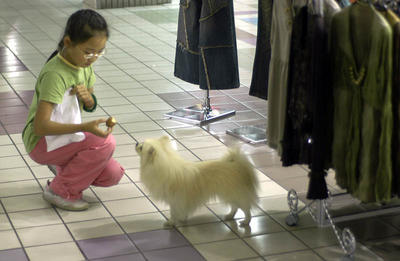
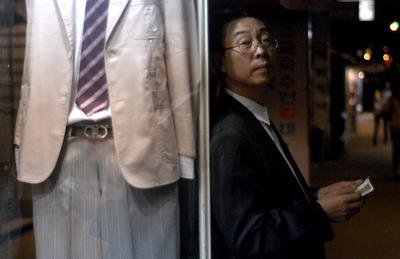
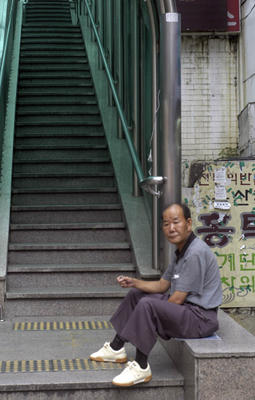

It's been an eventful week.
We were given Monday off due to the Chusok holiday.
On the teaching front, I have become a Lord of Discipline, having discovered a new and wickedly efficient form of crowd-control: Writing English! The Koreans have their own special way of holding a pen or pencil when they write in Hangul, so (as I've said before) writing in English is awkward and even painful for many of them. So when any of my classes gave me any trouble last week I had them write a paragraph about their Chusok holiday.
"Noooaaaaa, teacha!!!'
Then if they were really bad I would have them stand and deliver their torturous compositions (which at times was a little painful for me, too).
Make no mistake: English is a wretched language bereft of anything resembling logic or grace, and these kids stumble over it constantly, God bless them. An extra vowel can be heard hitching a ride on the back of an unsuspecting word. For example: Noa (no). Teacherah (teacher). Stickerah (sticker). Or they confuse or insert extra pronouns into sentences. Often times the "which, witch" "this, that" "road, rode" conundrums transform a simple composition on their favorite food into something akin to radical free-style poetry. Next week I'll find a good example and post it.
English can be maddening to teach. I have become a pantomiming master skilled at transforming words into visual monologues. I hobble in front of the class hunched over an imaginary cane craning my neck and cupping a hand to my ear like a shrivled old geezer. "Grandpadder!!!" the kids yell. For "grandmother" I do the same thing but I cup my hands over my chest first. The kids break out in riotous laughter and scream out "grandmudda!!!"
It's when I have to explain the difference between isn't and aren't that I hit a wall and my woeful lack of training gets shoved in my face. I furiously write on the blackboard, diagraming "singular" and then "isn't," and "plurul" and then "aren't." My masterpiece complete, I'll turn around triumphantly and one of the students will stick his hand in the air. "Teachaah. What singular means?"
My classes are beginning to develop their own personalities. All but one of my seven youngest students (1-2P) have come around and started paying attention. They're barely eight years old and they have a better grasp of English than my 6A students who are nearly twice their age. One of the early mistakes I made was assuming the students had been studying English all their lives. Annnnnnttt! WRONG! What does he win, Johnny? He's won an all-expense paid trip to the GS25 to buy more Tylenol!
The really fun kids are the 5A's I inherited from Dennis. They're ridiculously bright, and if I can focus their energy on a task they are a pleasure to teach. I have a group of seven sixteen year old boys in my 3E2 I call my "Crew." They like playing Scategories, acting out professions, animals and famous people. They're social structure revolves around an "alpha male" named Gong-ok. If I have his cooperation, I have everyone's cooperation, and Gong-ok decided early on that I was to be respected. I have a similar group of girls, my 1E2s. Then I have three huge classes of high schoolers who are almost impossible to control through conventional means. They made something crystal clear during my first week: Keep us interested and occupied every bloody second or dig a bunker and take cover.
So I invented a game: Human Scrabble. I divide the class into teams and everyone draws a huge consonant and a huge vowel. They then have two minutes to make the longest word they can with their letters. It's a riot! I had one class come up with words like 'Spiderman' and 'achievement. They have fun competing with one another and most importantly, all that energy is focused and working on something involving English.
Enough about work. As you can tell from the above photos, I've been socializing. Last night I went with Robin and Julie (the two girls laughing) to a house party in seomyeong or somewhere. It was great. The host, who has been here for three years, prepared traditional Korean food, homemade Kimchi (that even now makes my mouth water), along with Chinese stir-fry and even an Mexican bean dip and southern style deviled eggs. We stayed up dancing and socializing till the sun came up this morning. A good time was had by all.
Mike's time here is getting short. He leaves October 11th. Julie, too, will be gone by November. I can't speak for Dennis, but I'm pretty sure he's not as enraptured with Korea as I am. There is a lot of turnover among the aliens (e.g. us) as people finish their contracts and head to places far and wide. Laura, our host, told me it becomes difficult to make friends. You start to get to know someone and they up and leave for Slovakia or Brazil or somwhere three months later. Brief affairs are the rule among the tight social circles of Busan. You have to remember there are less than 800 registered aliens hidden among the 4.5 million residents of Busan.
Of course, many aliens turn to the Koreans for their emotional and sexual needs. Julie has a friend who is having a baby by her Korean boyfriend. Laura, the host at the party, has a Korean boyfriend and her Austrailian friend Andrew has a Korean girlfriend. I went to the bars in the PNU district for the first time Friday night and discovered that the rumors were indeed true: Korean women find Western men irresistable. No, I didn't experience this first hand. As usual, I witnessed it from the bar afar or from my sweaty vantage point on the dance floor. A "playa" I am not. Julie and I danced and had a good time and that was enough for me for my first night out on the town.
The bars were remarkably tiny. At the dance club Soul Trane I expected to walk into a massive multi-leveled multi-bar'd techno-lit disco-ball riddled cafeteria of debauchery. Soul Trane was a one-bar dance club with a dance floor no bigger than my tiny apartment. The crush of people all sweating in one place was overwhelming and I periodically extracted myself for a bit of the fresh Busan air scented with garbage and rotting fish. Ahhhhhhh, amore!
Though many teachers barely make it a year here, many others stay in Korea for years and years. I met a man from Ottawa, Canada, who has been in Korea for two years and recently signed up for a third.
"Back in Ottawa, I am not making as good money and on top of that the government takes 30% of it away from me," he explained. "Here I have the same standard of living but I'm saving thousands and thousands of dollars a year. Where else can you do that?" He had a point.
One of the Korean teachers, In-Hye (pronounced in-hey), met me at Kosin University today for my first lesson in Hangul. I hadn't slept in over 24 hours. I smelled like ciggarettes, alcohol and ugly sweaty women. In-hye, who is an ultra-orthodox Christian, was quite concerned for her schookered student. "You look really tiwerd," she'd say. "Drinking ahcahoo last night?" "Yes," I'd admit shamefully. "But the word is 'booze,'" and I'd spend ten minutes explaining how to pronounce 'booze' to In-hye. This seemed to cheer her up, I don't know why. By the end of our lesson I had sobered up enough to have a decent conversation following the lesson. In-hye made for pleasant company as we walked to the bus stop, talking about our respective languages.
OK, I got to go. I've been in this PC-Bong for three hours and I've racked up a MASSIVE bill typing away for you guys: about $2. Till next time...
--Notes
Thursday, September 22, 2005
Drumroll, please...
For your viewing pleasure, strait from the Land of The Morning Calm, comes photos...of Korea! Yeah!
OK, that was way too much excitement. I gotta get a grip.
Three cheers for Stephen, who with the help of his trusty Korean phrasebook, downloaded Photoshop Elements and processed his images! On the blog updates below you will find pictures of the city of Busan, Tangosa Temple, Geoge-do island and San Fransisco. There would be even MORE photos, but I only have one CF card and my laptop has been broken for the last 23 days. Thus, I have become the unfeated, all-powerful Chimp won do Master! Hee-ya! Take THAT you slightly out-of-focus image!
One of the main things I like about working as a school teacher is it frees me up to pour my heart and soul into my photography. At the end of the day I hit the Nampo-dong market, set my aperture to 1.8 and my ISO to 800 and walk the crowded alleyways, prowling for images. Whenever Julie (my roommate) and I ride somewhere on her bike, I've got the camera on me. It's no longer my job, and so it's fun, it allows me to be creative. Busan is giving me the space to rekindle my love affair with photography.
So eat these images up, tell me what you think, and keep up with the blog. Peace!
--Notes
For your viewing pleasure, strait from the Land of The Morning Calm, comes photos...of Korea! Yeah!
OK, that was way too much excitement. I gotta get a grip.
Three cheers for Stephen, who with the help of his trusty Korean phrasebook, downloaded Photoshop Elements and processed his images! On the blog updates below you will find pictures of the city of Busan, Tangosa Temple, Geoge-do island and San Fransisco. There would be even MORE photos, but I only have one CF card and my laptop has been broken for the last 23 days. Thus, I have become the unfeated, all-powerful Chimp won do Master! Hee-ya! Take THAT you slightly out-of-focus image!
One of the main things I like about working as a school teacher is it frees me up to pour my heart and soul into my photography. At the end of the day I hit the Nampo-dong market, set my aperture to 1.8 and my ISO to 800 and walk the crowded alleyways, prowling for images. Whenever Julie (my roommate) and I ride somewhere on her bike, I've got the camera on me. It's no longer my job, and so it's fun, it allows me to be creative. Busan is giving me the space to rekindle my love affair with photography.
So eat these images up, tell me what you think, and keep up with the blog. Peace!
--Notes


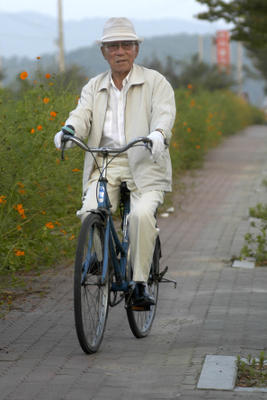

These shots are from our bike/subway/bus trip to the ancient city of Geonju. The girl was waiting for her father to pick some sort of plant. The girl standing under the pagoda is a friend of Julie's named Robin. That offensive-looking plate of food is the most delicious creation known to man: Cheesy Dankas. Basically, they stuff a pork loin full of cheese and deep-fat-fry it and then drench it in a sweet gravy. It is literally an invitation to a heart specialist swaddled in cheese.
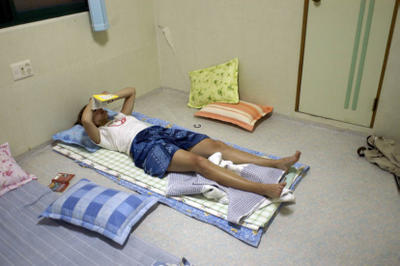


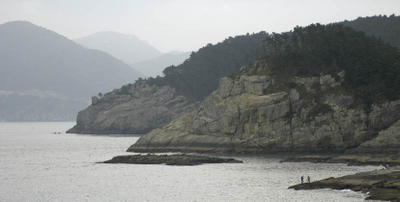
OK, these photos are from Julie and my adventure in Geoge island. We rode Julie's bike down to Jimhae where we caught a ferry to the beautiful island of Geoge-do. We rode around all day and got lost and missed the ferry home (the last one is at 7:30). That's Julie reading on the comfortable floor of our hotel room. No, I didn't get the bed. There are no beds in Korean hotel rooms. They give you pillows (or wooden blocks), blankets and a nice comfy sheet o linoleum. Great trip, bad quarters, thirty dollars. Nuff said.





OK, these five photos are of my home in Busan. The two aerial photos were actually taken from the top of the mountain rising behind my apartment building. The photo of the cluster of apartment buildings is my home, Hamgegreen. The overall shot is of Busan harbor with the city stretching away towards the background. Pretty wild, huh? The little troublemaker making a face at me is in my 4B class. It's my hardest class, and he's one of the worst students, but I like him anyway. God knows I wouldn't want to be learning this bassacwards language either when Hangul is so much easier. That's the only traffic shot I have. Pretty bad, I know, but I don't like shooting traffic shots (Gavin, you are probably the only person reading this who knows why).
OK, the photos in the posts below are general shots of Busan taken over the last three weeks. The guy staring me down was photographed in the Nampo-dong market. The white girl doing limbo is my roommate, Julie, from Montreal (NOT Toronto). The muslim girl was photographed on a subway train going out towards the city of Geonju. Don't worry, the orange guy in the gutter is just sleeping (I think). I took the photo of the old man during the Chusok Holiday weekend in Nampo-dong, where I work. Gotta love that shot of Korean "Thugs" hangin' on a street corner in Nampo-dong. Don't worry, they're quite harmless. Pizza delivery guys on break, I think. The dog I photographed from the back of Julie's bike while heading out to Tangdosa Temple. The photograph of the little girl with the soda was taken in the Nampo-dong market, and the same for the photograph of the other little girl hugging her granny. Just after taking that photo I got hit by a guy on the scooter. Don't worry, the scooter was fine. The photo of the girl walking along the sidewalk was included to make sure everyone knew that yes, there are trees here. They have an inch or two of soil around the base of the trunk, giving the impression that they are growing out of the concrete itself. The next photo is of the only Korean graffiti I can find, and now I'm not so sure it's graffiti. I photographed the old guy is sitting next to the beach in the Haeundae area of town. The pan-blur photo of the guy on the bike was taken near where I work in Nampo-dong. The kid playing soccer and the fishermen where photographed near Hamgegreen, my apartment complex on Yeong-do island.
Wednesday, September 21, 2005
Another day has ended in Korea. My hands are blue, yellow and white with chalk powder. My legs ache from standing for nearly five hours strait. My back hurts and my voice is a thin ghost of it's former volume which I think might have a correlation to the number of times I scream "be quiet!!!" Still, it's rewarding work.
As I walk down the fourth-floor hallway the students wave to me and say, "hi Mr. Steepen," or "hallloooo" or just giggle as one of the school's four pet westerners saunters down the hall. A few of the students I know on a first-name basis, and I give them a knowing nod as I pass. Usually it's the bad kids. I scream their names the most.
When I was working for the small newspaper in southern Mississippi I was an little more than an underpaid event photographer. Every now and then I landed a hard news assignment such as a housefire or soldier's funeral, but most of my assignments were simple social or political events, oodles of environmental portraits and the occasional summer swimming pool photo or fishfry. I was a university-educated, seasoned photojournalist with years of experience under my belt. I made $12.30 an hour.
Here in Korea, I am an overpaid babysitter. Under the thin pretext of teaching English, I keep between seven and twenty Korean children off the streets and occupied with something besides pop music for 45 minutes at a time. I have absolutely no formal educational foundation for this position and no experience. My training consisted of watching the other three Westerners teach for one day. I make nearly $20 an hour.
Go figure.
Like I have said before, English is an obsession in Korea. When ESS Best Junior Acadamy was started by our current director's older brother it was only the second English Language Institute in Korea. Now there are literally thousands carpeting the whole country and the competition for students and Westerners is fierce. Back in 1960 Mr. Kim taught English through simple theater, plays. Now there are classes in conversing in, writing and reading English for all education levels and ages all the way up to adults, who take classes at a separate building down the street.
For most Koreans, English is fun to learn but almost completely useless. Although only 90 million people speak Korean, most of them live here in the Republic or in the North. The language, Hangul, was codefied by scholars under King Sejong III back in the 1400s and is a source of tremendous pride among everyday Koreans. It is a ridiculously easy language to learn to read. I picked it up on the twelve-hour flight to Seoul. However, the small pool of native speakers and the domination of English over the business world have restricted Hangul to it's native land. The Korean people use it exclusively with little need to learn another tongue.
It was the American influence after World War II that kicked off the Korean's fascination with the English language. Among the middle class, to be able to send your children to a language institute employing flesh and blood Westerners is a mark of high sophistication. We are exotica to the Koreans, fancy Western luxuries like Levis, Outback Steakhouse and BMWs. Never mind that most of us aren't certified teachers. Never mind that many of us barely understand our native tongue beyond simply speaking it. Never mind that many of us are here because we are disgusted with the very Western culture the Koreans love so much. Put that all aside. In Korea, it's all about image, and there is nothing that looks better than knowing your kids are learning English from Westerners.
So if we actually aren't doing that great a job, who cares? The kids are tested, quized and graded, but their marks mean little since they are not required to attend a language institute. The little monsters know this, too. They learn in hour-and-a-half long blocks split into 45-minute sections. I teach one section and a native Korean teacher picks up the second. We teach from the same material. The difference is that the children would never think of treating a Korean teacher with disrespect. No such brainwashing was done for Westerners. When I walk in that door the gloves come off, so to speak. I have to earn their respect and for most of them it doesn't come cheap.
This is hard work. The second I walk into my 1-2P class at precisely 2:30PM those kids are testing me, trying my patience to see how elastic it is. They may not want or be required to be in that classroom at 2:30PM, but I am, and these are the rules: No talking in Korean. No spitting, hitting, running, jumping, poking, screaming, sleeping, mocking or fighting. And absolutely no stickers! The Korean children collect stickers and redeem them for valuble prizes (such as pencils) at the end of the semester. In the first few days of teaching I was THE source for stickers as I tried to purchase my respect. As the great John Lennon would say...
...Can't buy me love.
No, a classroom is a benevolent dictatorship and I am the Great Leader. It didn't take me long before I realized if I was going to get anything done whatsoever I need ed to get mean. The other teachers had warned me about this, but I didn't heed their words of experience. And as I said in the last blog, it's easier to be mean first and get nicer than vice versa.
But now, two weeks in, I am making progress. The Korean teachers help alot. If I have a class that won't behave no matter what I do, I tell my Korean "wingman." The next time I go into class you can hear a pin drop. In a couple of days their back to their normal sugar-crazed frenzy, but the break allows me time to come up with some disciplinary strategies. Making them stand, switch seats, or write "I will not not talk while teacher gives class" thirty times are all useful techniques.
It helps that Korean children are fundamentally good students. From the age of six to their early twenties they are in school of some kind twelve months a year from seven in the morning to nine at night. They are skillful learners who easily consume and digest material. Even if they don't want to, their natural instinct is to learn, because their entire existence is focused on precious little else. I have a few good students in my class, and they are rays of glorious sunshine in my dreary little classrooms.
Make no mistake, I love all of my students, even the bad ones. I don't take their misbehavior personally, though I make a big deal about it here. They are children, and I was no different when I was their age. The past two weeks have been an eye-opening, mind-blowing experience. I actually look forward to going to work every day simply because I have no idea what is going to take place.
Well, I got to leave you. I got my computer back, but it still isn't working. My camera's flash memory is just about filled up (and I've been edited like crazy). So I have to get this thing working fast. If anyone knows how to make an iBook with no operating system realize it has a harddrive, please drop me a message. Peace. --Notes 9/21/05
As I walk down the fourth-floor hallway the students wave to me and say, "hi Mr. Steepen," or "hallloooo" or just giggle as one of the school's four pet westerners saunters down the hall. A few of the students I know on a first-name basis, and I give them a knowing nod as I pass. Usually it's the bad kids. I scream their names the most.
When I was working for the small newspaper in southern Mississippi I was an little more than an underpaid event photographer. Every now and then I landed a hard news assignment such as a housefire or soldier's funeral, but most of my assignments were simple social or political events, oodles of environmental portraits and the occasional summer swimming pool photo or fishfry. I was a university-educated, seasoned photojournalist with years of experience under my belt. I made $12.30 an hour.
Here in Korea, I am an overpaid babysitter. Under the thin pretext of teaching English, I keep between seven and twenty Korean children off the streets and occupied with something besides pop music for 45 minutes at a time. I have absolutely no formal educational foundation for this position and no experience. My training consisted of watching the other three Westerners teach for one day. I make nearly $20 an hour.
Go figure.
Like I have said before, English is an obsession in Korea. When ESS Best Junior Acadamy was started by our current director's older brother it was only the second English Language Institute in Korea. Now there are literally thousands carpeting the whole country and the competition for students and Westerners is fierce. Back in 1960 Mr. Kim taught English through simple theater, plays. Now there are classes in conversing in, writing and reading English for all education levels and ages all the way up to adults, who take classes at a separate building down the street.
For most Koreans, English is fun to learn but almost completely useless. Although only 90 million people speak Korean, most of them live here in the Republic or in the North. The language, Hangul, was codefied by scholars under King Sejong III back in the 1400s and is a source of tremendous pride among everyday Koreans. It is a ridiculously easy language to learn to read. I picked it up on the twelve-hour flight to Seoul. However, the small pool of native speakers and the domination of English over the business world have restricted Hangul to it's native land. The Korean people use it exclusively with little need to learn another tongue.
It was the American influence after World War II that kicked off the Korean's fascination with the English language. Among the middle class, to be able to send your children to a language institute employing flesh and blood Westerners is a mark of high sophistication. We are exotica to the Koreans, fancy Western luxuries like Levis, Outback Steakhouse and BMWs. Never mind that most of us aren't certified teachers. Never mind that many of us barely understand our native tongue beyond simply speaking it. Never mind that many of us are here because we are disgusted with the very Western culture the Koreans love so much. Put that all aside. In Korea, it's all about image, and there is nothing that looks better than knowing your kids are learning English from Westerners.
So if we actually aren't doing that great a job, who cares? The kids are tested, quized and graded, but their marks mean little since they are not required to attend a language institute. The little monsters know this, too. They learn in hour-and-a-half long blocks split into 45-minute sections. I teach one section and a native Korean teacher picks up the second. We teach from the same material. The difference is that the children would never think of treating a Korean teacher with disrespect. No such brainwashing was done for Westerners. When I walk in that door the gloves come off, so to speak. I have to earn their respect and for most of them it doesn't come cheap.
This is hard work. The second I walk into my 1-2P class at precisely 2:30PM those kids are testing me, trying my patience to see how elastic it is. They may not want or be required to be in that classroom at 2:30PM, but I am, and these are the rules: No talking in Korean. No spitting, hitting, running, jumping, poking, screaming, sleeping, mocking or fighting. And absolutely no stickers! The Korean children collect stickers and redeem them for valuble prizes (such as pencils) at the end of the semester. In the first few days of teaching I was THE source for stickers as I tried to purchase my respect. As the great John Lennon would say...
...Can't buy me love.
No, a classroom is a benevolent dictatorship and I am the Great Leader. It didn't take me long before I realized if I was going to get anything done whatsoever I need ed to get mean. The other teachers had warned me about this, but I didn't heed their words of experience. And as I said in the last blog, it's easier to be mean first and get nicer than vice versa.
But now, two weeks in, I am making progress. The Korean teachers help alot. If I have a class that won't behave no matter what I do, I tell my Korean "wingman." The next time I go into class you can hear a pin drop. In a couple of days their back to their normal sugar-crazed frenzy, but the break allows me time to come up with some disciplinary strategies. Making them stand, switch seats, or write "I will not not talk while teacher gives class" thirty times are all useful techniques.
It helps that Korean children are fundamentally good students. From the age of six to their early twenties they are in school of some kind twelve months a year from seven in the morning to nine at night. They are skillful learners who easily consume and digest material. Even if they don't want to, their natural instinct is to learn, because their entire existence is focused on precious little else. I have a few good students in my class, and they are rays of glorious sunshine in my dreary little classrooms.
Make no mistake, I love all of my students, even the bad ones. I don't take their misbehavior personally, though I make a big deal about it here. They are children, and I was no different when I was their age. The past two weeks have been an eye-opening, mind-blowing experience. I actually look forward to going to work every day simply because I have no idea what is going to take place.
Well, I got to leave you. I got my computer back, but it still isn't working. My camera's flash memory is just about filled up (and I've been edited like crazy). So I have to get this thing working fast. If anyone knows how to make an iBook with no operating system realize it has a harddrive, please drop me a message. Peace. --Notes 9/21/05
Sunday, September 18, 2005
Well, another week has come to a close in South Korea. I can't believe I've been here only two weeks. I've seen a lot, thanks to Julie. Yesterday she, her friend Robin and Robin's friend Shoko (from Japan) and I all piled onto a subway train and headed out to the city of Geonju.
We boarded a bus at the central terminal north of the Pusan National University district. I didn't think to use the restroom before I got on the bus, as I expected it to be a short 45-minute drive. However, this is the weekend when Koreans celebrate the holiday of Chusok, roughly equivalent to Thanksgiving in the States. Koreans celebrate Chusok by visiting their elders and presenting them with gifts. Everywhere you went there were people with special Chusok boxes stuffed with soaps, candy and even Spam. Interstate 1 (there aren't a whole lot here) was clogged with people and the Pepsi I had downed earlier began to fill my bladder.
I tried to sleep through the growing pain in my lower abdomen while the bus inched along. Within an hour I was in some of the worst pain in my life, fighting hard not to piss myself right then and there. My friends were alarmed by my pain. I was sweating and my arms were bloated so bad that I had to take my watch off. I stumbled to the front of the bus and begged the driver in broken Korean to stop the bus. As luck would have it, he spoke perfect English and pulled the bus over. The crowded bus leaned against the window to watch this poor stupid American relieve himself along the side of the interstate.
My humiliation complete, the bus took us into Geonju. Geonju is one of the more ancient cities in South Korea. The whole of the city is like Rome, lined with ancient streets, houses and burial mounds from the 9th century. A number of bicycle rental companies have sprouted up to meet the demand for cheap, pleasant transportation through the narrow streets. To the north is a famous Buddhist temple called Bulgoksa (sp) and a number of mountains sporting ancient buddhist statuary.
We decided to catch a city bus out to Namsan Mountain and hike among the 9th-century Buddhist statues resting in the forrest. The bus let us out in a dusty, nearly-deserted parking lot adjacent to a small farming community. Fields of ripe rice stretched out towards the distant city of Geonju on the other side of the valley. Patches of red peppers and squash lined the streets of the tiny village. We consumed a bowl of ramen noodle and made our way into the village hoping to find the trails we read about.
We wandered for two hours, failing to find a trail. The mountain was to our right, but there were no signs indicated how we might climb her. Instead, we decided to give up on our quest and go back to town where we could rent bikes and tour the city. We caught a cab who misunderstood us and brought us to the massive Geonju National Museum complex. Admission was only 40 American cents.
Just past the entrance to the museum is a gong weighing 19 tons made in the Silla Dynasty. It is the largest ever made by any Asian culture and has a sordid, gruesome history. When it was originally cast, there was structural defect and the gong would not ring. It was re-cast, and this time a little boy was thrown into the molten iron as a sacrifice to make the gong ring as per a revelation from God given to the King's head priest. The gong is nicknamed the "mommy" gong (english translation) because that's what the boy was screaming as they threw him in.
Great. Just great. God, I am so glad I am a part of the human race. I gave the finger to the mommy gong and toured the museum. It was filled with artifacts unearthed from Geonju: Pottery, spears, swords, Buddhist figures, rocks that held Buddhist figures, pagodas, etc. It was all very interesting, but tiring. We left the museum and made our way back to town.
The one-eyed man who owned the bicycle shop spoke english, and despite the fact that he was closing in an hour he arranged to meet us back at the shop in three hours to pick up the bikes. Five dollars a day for a bicycle can't be beat. We rode them all over town, along the river, stopping only for dinner. After dinner we rode out to a Chusok festival and listened to some traditional Korean music.
Today I am wandering the endless markets of Nampo-dong looking for a shower curtain. Unlike in the states, holidays are no excuse to close the stores. People line the avenues and alleyways picking over the stalls for whatever they can or want to find. It's better than wal-mart: It's outside, there is anything you could ever dream to buy, and you can haggle over the price. If you are into people watching, Nampo-dong cannot be beat. But I'll write more on this later. I'm at a PC-bong, or room, where you can rent a hyper-fast internet-ready computer for a dollar an hour. It's great, but I really must return to shopping. It's going to take a while to find a shower-curtain stall, even here.
--Notes
We boarded a bus at the central terminal north of the Pusan National University district. I didn't think to use the restroom before I got on the bus, as I expected it to be a short 45-minute drive. However, this is the weekend when Koreans celebrate the holiday of Chusok, roughly equivalent to Thanksgiving in the States. Koreans celebrate Chusok by visiting their elders and presenting them with gifts. Everywhere you went there were people with special Chusok boxes stuffed with soaps, candy and even Spam. Interstate 1 (there aren't a whole lot here) was clogged with people and the Pepsi I had downed earlier began to fill my bladder.
I tried to sleep through the growing pain in my lower abdomen while the bus inched along. Within an hour I was in some of the worst pain in my life, fighting hard not to piss myself right then and there. My friends were alarmed by my pain. I was sweating and my arms were bloated so bad that I had to take my watch off. I stumbled to the front of the bus and begged the driver in broken Korean to stop the bus. As luck would have it, he spoke perfect English and pulled the bus over. The crowded bus leaned against the window to watch this poor stupid American relieve himself along the side of the interstate.
My humiliation complete, the bus took us into Geonju. Geonju is one of the more ancient cities in South Korea. The whole of the city is like Rome, lined with ancient streets, houses and burial mounds from the 9th century. A number of bicycle rental companies have sprouted up to meet the demand for cheap, pleasant transportation through the narrow streets. To the north is a famous Buddhist temple called Bulgoksa (sp) and a number of mountains sporting ancient buddhist statuary.
We decided to catch a city bus out to Namsan Mountain and hike among the 9th-century Buddhist statues resting in the forrest. The bus let us out in a dusty, nearly-deserted parking lot adjacent to a small farming community. Fields of ripe rice stretched out towards the distant city of Geonju on the other side of the valley. Patches of red peppers and squash lined the streets of the tiny village. We consumed a bowl of ramen noodle and made our way into the village hoping to find the trails we read about.
We wandered for two hours, failing to find a trail. The mountain was to our right, but there were no signs indicated how we might climb her. Instead, we decided to give up on our quest and go back to town where we could rent bikes and tour the city. We caught a cab who misunderstood us and brought us to the massive Geonju National Museum complex. Admission was only 40 American cents.
Just past the entrance to the museum is a gong weighing 19 tons made in the Silla Dynasty. It is the largest ever made by any Asian culture and has a sordid, gruesome history. When it was originally cast, there was structural defect and the gong would not ring. It was re-cast, and this time a little boy was thrown into the molten iron as a sacrifice to make the gong ring as per a revelation from God given to the King's head priest. The gong is nicknamed the "mommy" gong (english translation) because that's what the boy was screaming as they threw him in.
Great. Just great. God, I am so glad I am a part of the human race. I gave the finger to the mommy gong and toured the museum. It was filled with artifacts unearthed from Geonju: Pottery, spears, swords, Buddhist figures, rocks that held Buddhist figures, pagodas, etc. It was all very interesting, but tiring. We left the museum and made our way back to town.
The one-eyed man who owned the bicycle shop spoke english, and despite the fact that he was closing in an hour he arranged to meet us back at the shop in three hours to pick up the bikes. Five dollars a day for a bicycle can't be beat. We rode them all over town, along the river, stopping only for dinner. After dinner we rode out to a Chusok festival and listened to some traditional Korean music.
Today I am wandering the endless markets of Nampo-dong looking for a shower curtain. Unlike in the states, holidays are no excuse to close the stores. People line the avenues and alleyways picking over the stalls for whatever they can or want to find. It's better than wal-mart: It's outside, there is anything you could ever dream to buy, and you can haggle over the price. If you are into people watching, Nampo-dong cannot be beat. But I'll write more on this later. I'm at a PC-bong, or room, where you can rent a hyper-fast internet-ready computer for a dollar an hour. It's great, but I really must return to shopping. It's going to take a while to find a shower-curtain stall, even here.
--Notes
Friday, September 16, 2005
I don't have much time to write, but I did get my computer back. As soon as I get the operating system back online I'll write more. Compounding my writer's block is the surprising fact that the Korean teachers are incorrigible snoops and gossips. I was writing an email to a female friend when the director called me into his office next to the computer room. I minimized the message window and got up and talked in Director Kim's office for ten minutes. When I came back it was seemingly undisturbed. The next day all the Korean teachers could talk about was my "girlfriend." It was revealed to me today that the Korean teachers wait for me to go home and they jump on whatever computer I was using and check where I was surfing and what I was writing. They do this to ALL the anglo teachers.
I am pretty sure it's just curiosity, and I really don't have any problems with it because I don't do any naughty surfing and my email life is as sordid as a glass of cold water. To me, this behavior is just another manifestation of what Julie's friend Debbie calls "The Korean Logic." Koreans don't value the individual's right to privacy quite like Americans to. For example, I was taking a relaxing piss in a restaurant last weekend. Suddenly, a woman walks into the restroom, enters the stall to my right and proceeds to evacuate her bowels. As I was washing my hands, two more women and a man walked into the bathroom. The women fussed with their makeup and the man took a piss. OK, I thought. I checked the sign on my way out the door. It was a unisex bathroom. There are a lot of unisex bathrooms in Korea. The segregated restrooms one finds in the states make up a minority of restrooms in Korea.
While we're on the subject of restrooms, I might add that you are damn lucky to find a real toilet in a public restroom. Most of the time it's a porceline (sp?) hole in the floor you can flush with grippy-textured places for your feet. Sorry, but I shit in holes when I'm in the woods. This is the 21st century and yes, the sitting toilet has indeed been invented. It's really one of the great triumphs of modern ergonomics, and one comes to appreciate the simple sitting toilet more and more while trying not to lose one's balance and keel over ass-first into a Korean "toilet."
OK, enough potty humor.
The first thing I am going to do when I get back to the states is visit every single one of my middle and high school teachers, fall to my knees and beg their forgiveness for being the obnoxious little shit I was so many times during my formative years.
I made a terrible mistake during my first week of teaching here at ESS: I was nice. I was more than nice, I was downright friendly with the students, and now the children walk all over me. The beginning of the week saw me trying to stop the children from goofing off as a man might try and stop a wave with a bucket. The rest of the week has been spent trying to make up for that mistake, and most of the children I teach now downright hate me and my new mean streak. It's one thing to be mean and then soften up. It's quite another to work that equation in reverse.
Children can smell fear, and I have a natural tendency to want to be liked by everybody. In the world of teaching, such a tendency is NOT a positive survival trait. For the first week of classes I was being naturally selected out of the educational gene pool.
How does one get a class of twenty screaming Korean children who don't want to be there to shut up and learn English for 45 minutes? I'd tell you, but Mr. Ye says I have to go home now because the school is closing up. We'll save it for tomorrow, yes?
I am pretty sure it's just curiosity, and I really don't have any problems with it because I don't do any naughty surfing and my email life is as sordid as a glass of cold water. To me, this behavior is just another manifestation of what Julie's friend Debbie calls "The Korean Logic." Koreans don't value the individual's right to privacy quite like Americans to. For example, I was taking a relaxing piss in a restaurant last weekend. Suddenly, a woman walks into the restroom, enters the stall to my right and proceeds to evacuate her bowels. As I was washing my hands, two more women and a man walked into the bathroom. The women fussed with their makeup and the man took a piss. OK, I thought. I checked the sign on my way out the door. It was a unisex bathroom. There are a lot of unisex bathrooms in Korea. The segregated restrooms one finds in the states make up a minority of restrooms in Korea.
While we're on the subject of restrooms, I might add that you are damn lucky to find a real toilet in a public restroom. Most of the time it's a porceline (sp?) hole in the floor you can flush with grippy-textured places for your feet. Sorry, but I shit in holes when I'm in the woods. This is the 21st century and yes, the sitting toilet has indeed been invented. It's really one of the great triumphs of modern ergonomics, and one comes to appreciate the simple sitting toilet more and more while trying not to lose one's balance and keel over ass-first into a Korean "toilet."
OK, enough potty humor.
The first thing I am going to do when I get back to the states is visit every single one of my middle and high school teachers, fall to my knees and beg their forgiveness for being the obnoxious little shit I was so many times during my formative years.
I made a terrible mistake during my first week of teaching here at ESS: I was nice. I was more than nice, I was downright friendly with the students, and now the children walk all over me. The beginning of the week saw me trying to stop the children from goofing off as a man might try and stop a wave with a bucket. The rest of the week has been spent trying to make up for that mistake, and most of the children I teach now downright hate me and my new mean streak. It's one thing to be mean and then soften up. It's quite another to work that equation in reverse.
Children can smell fear, and I have a natural tendency to want to be liked by everybody. In the world of teaching, such a tendency is NOT a positive survival trait. For the first week of classes I was being naturally selected out of the educational gene pool.
How does one get a class of twenty screaming Korean children who don't want to be there to shut up and learn English for 45 minutes? I'd tell you, but Mr. Ye says I have to go home now because the school is closing up. We'll save it for tomorrow, yes?
Tuesday, September 13, 2005
I just finished teaching six classes of screaming, poking, disruptive little Korean children how to speak English. I really don't have the time or energy to sit down and write a full-on entry. If I am going to get anywhere with this blog, I am going to have to write in the morning, and to do that I need my laptop. Never in my life have I missed a stupid piece of electronic gadgetry as I miss my laptop right now.
But I composed this (rough) poem about transportation in Korea. Ahem...
The bus drivers are all maniacs
the cabbies must be blind
Julie's bike keeps breaking down
in fives lanes of traffic roaring honking swerving
passing close enough to touch.
The city is a canyon and
The Koreans are the water and
The Americans are the boats.
Signs pass me by, screaming
blaring nothing in loud neon voices
drowned by the roar of Julie's bike.
OK, it's kinda free verse. Actually, it kinda needs ALOT of work. But perhaps it gives the reader a vignette of getting from point A to point B in Korea.
Busan is a HUGE city. I climbed the mountain behind my house last week and met a professor from Busan National University. He indicated with his finger the full fifty kilometers (30 miles for my fellow Americans) that Busan stretches down the coast. It is basically one gigantic international port. There are so many ships in the water that from my vantage point on the mountain top I can see the rough lanes they travel both within the harbors and out in the ocean. Dozens and dozens of high-prowed fishing vessels, huge container ships laden with goods, tankers of all sorts and tiny private yachts form lines in the ocean stretching from horizon to horizon. It being a clear day and me being more than 300 meters high, I got a special treat.
"Ilbon," said the professor, pointing to the southeast. Japan. One of the lesser islands belonging to Japan, to be more precise, but Japan none the less. The mountain peaks poked above the distant horizon. It gave me a chill. Numerous violently successful invasions of Korea have come from that direction. Korea has only been out from under Japanese rule for the last fifty years thanks to America.
The sight of that island must be a constant reminder of the deep hatred Koreans harbor for the Japanese. Currently, the two countries are hotly contesting a tiny, lifeless piece of rock off the northern coast of Korea called Dok-do. The Koreans, bolstered by their 37,000-strong American Marine force, have decided to call it their own. The Japanese, with it's slightly lesser American muscle, have done the same. As my friend Gavin likes to say, "And hilarity ensues."
Today my 5A class (fourth graders) sang me a song titled "Dok-do Neun Woori Dong," which roughly translates to "Dok-do belongs to us." The simple lines to this song go something like this, over and over again:
Dok-do is our island
Dok-do is Korean island
I recorded it with my minidisk player, so as soon as I get my #&%!!!#@* laptop I'll upload the soundbyte to the blog. American nationalism usually consists of smug bumper stickers and happy patriotic songs glorifying freedom. Korean nationalism consists of telling the Japanese where they can stick it. You gotta love such a blatant and unremorseful show of political incorrectness.
Anyway, back to transportation.
Coming down from my American addiction to the automobile has been easier than I thought. First of all, there is a first-rate bus and subway system that would shame most American cities. It is easy to use, fast, efficient, and absolutely never late. Secondly, the cabs are cheap, knowledgable and fast. Thirdly (I hate that word), my roommate has a motorbike.
That being said, using the motorbike is to stare Death in the face for twenty to forty-five minutes at a time. Oh, and I ride on the back. The 125cc Harley-knockoff (which set dear Julie back only $500) is loud, hard to steer, and as I indicated in the poem, it can putter out at any minute.
Compounding these very real issues is the skill and manners of the drivers around you. Busan is a major city with huge six to eight lane streets spanning dozens of kilometers, every inch of which is covered in a hellish mix of taxies, buses, scooters, motorcycles and automobiles. As far as I can tell, traffic laws (if not all laws in Korea, but I'll get to that later) are only a suggestion at best. People run lights all the time, depending on if someone is coming from the other direction. Koreans must consider turn-signals some kind of Western curiosity, because they never use them. I have yet to see a speed-limit sign and tailgating must be Korea's national pasttime. What few cops you see don't dare concern themselves with traffic violations, they'd drive themselves mad!
According to Julie there is only one crime henious (sp?) enough to visit a traffic stop: Being white, female and Western. One girl we know has been pulled over a record eight times. She doesn't have a licence, tag or insurance (typical, actually), but that doesn't seem to bother the cops. They chat her up a little and let her go "all smiles."
There is one caveat to driving in Korea: Don't have any, and I mean ANY alcohol on your breath. There is no BAC laws here. If the cops even catch the faintest whisp of alcohol whatsoever they will haul you in. I have heard that this is in response to the vast number of cab drivers who spend much of their workday completely trashed.
Now, I have to give the Koreans their due: I have not seen an single traffic accident since I have been here. They drive like shit, but they drive like shit together. They merge, pass and flow like water in a rocky stream. They all seem to understand each other perfectly. The only people who present problems are us: The Westerners. We don't violate the laws in the same way they do and thus we are sand in their well-oiled machine.
Anyway, tomorrow or the next day or whenever I will get to WHERE Julie's bike (and Julie) have been escorting me. I hope you enjoyed this blog, I didn't really mean to write it. I just got caught up in it, I guess. Peace.
But I composed this (rough) poem about transportation in Korea. Ahem...
The bus drivers are all maniacs
the cabbies must be blind
Julie's bike keeps breaking down
in fives lanes of traffic roaring honking swerving
passing close enough to touch.
The city is a canyon and
The Koreans are the water and
The Americans are the boats.
Signs pass me by, screaming
blaring nothing in loud neon voices
drowned by the roar of Julie's bike.
OK, it's kinda free verse. Actually, it kinda needs ALOT of work. But perhaps it gives the reader a vignette of getting from point A to point B in Korea.
Busan is a HUGE city. I climbed the mountain behind my house last week and met a professor from Busan National University. He indicated with his finger the full fifty kilometers (30 miles for my fellow Americans) that Busan stretches down the coast. It is basically one gigantic international port. There are so many ships in the water that from my vantage point on the mountain top I can see the rough lanes they travel both within the harbors and out in the ocean. Dozens and dozens of high-prowed fishing vessels, huge container ships laden with goods, tankers of all sorts and tiny private yachts form lines in the ocean stretching from horizon to horizon. It being a clear day and me being more than 300 meters high, I got a special treat.
"Ilbon," said the professor, pointing to the southeast. Japan. One of the lesser islands belonging to Japan, to be more precise, but Japan none the less. The mountain peaks poked above the distant horizon. It gave me a chill. Numerous violently successful invasions of Korea have come from that direction. Korea has only been out from under Japanese rule for the last fifty years thanks to America.
The sight of that island must be a constant reminder of the deep hatred Koreans harbor for the Japanese. Currently, the two countries are hotly contesting a tiny, lifeless piece of rock off the northern coast of Korea called Dok-do. The Koreans, bolstered by their 37,000-strong American Marine force, have decided to call it their own. The Japanese, with it's slightly lesser American muscle, have done the same. As my friend Gavin likes to say, "And hilarity ensues."
Today my 5A class (fourth graders) sang me a song titled "Dok-do Neun Woori Dong," which roughly translates to "Dok-do belongs to us." The simple lines to this song go something like this, over and over again:
Dok-do is our island
Dok-do is Korean island
I recorded it with my minidisk player, so as soon as I get my #&%!!!#@* laptop I'll upload the soundbyte to the blog. American nationalism usually consists of smug bumper stickers and happy patriotic songs glorifying freedom. Korean nationalism consists of telling the Japanese where they can stick it. You gotta love such a blatant and unremorseful show of political incorrectness.
Anyway, back to transportation.
Coming down from my American addiction to the automobile has been easier than I thought. First of all, there is a first-rate bus and subway system that would shame most American cities. It is easy to use, fast, efficient, and absolutely never late. Secondly, the cabs are cheap, knowledgable and fast. Thirdly (I hate that word), my roommate has a motorbike.
That being said, using the motorbike is to stare Death in the face for twenty to forty-five minutes at a time. Oh, and I ride on the back. The 125cc Harley-knockoff (which set dear Julie back only $500) is loud, hard to steer, and as I indicated in the poem, it can putter out at any minute.
Compounding these very real issues is the skill and manners of the drivers around you. Busan is a major city with huge six to eight lane streets spanning dozens of kilometers, every inch of which is covered in a hellish mix of taxies, buses, scooters, motorcycles and automobiles. As far as I can tell, traffic laws (if not all laws in Korea, but I'll get to that later) are only a suggestion at best. People run lights all the time, depending on if someone is coming from the other direction. Koreans must consider turn-signals some kind of Western curiosity, because they never use them. I have yet to see a speed-limit sign and tailgating must be Korea's national pasttime. What few cops you see don't dare concern themselves with traffic violations, they'd drive themselves mad!
According to Julie there is only one crime henious (sp?) enough to visit a traffic stop: Being white, female and Western. One girl we know has been pulled over a record eight times. She doesn't have a licence, tag or insurance (typical, actually), but that doesn't seem to bother the cops. They chat her up a little and let her go "all smiles."
There is one caveat to driving in Korea: Don't have any, and I mean ANY alcohol on your breath. There is no BAC laws here. If the cops even catch the faintest whisp of alcohol whatsoever they will haul you in. I have heard that this is in response to the vast number of cab drivers who spend much of their workday completely trashed.
Now, I have to give the Koreans their due: I have not seen an single traffic accident since I have been here. They drive like shit, but they drive like shit together. They merge, pass and flow like water in a rocky stream. They all seem to understand each other perfectly. The only people who present problems are us: The Westerners. We don't violate the laws in the same way they do and thus we are sand in their well-oiled machine.
Anyway, tomorrow or the next day or whenever I will get to WHERE Julie's bike (and Julie) have been escorting me. I hope you enjoyed this blog, I didn't really mean to write it. I just got caught up in it, I guess. Peace.
Monday, September 12, 2005
Hello from Korea! Things have been getting better for me. I had my first solid bowel movement yesterday! Experiencing a new culture can be difficult when your ass is glued to a toilet for more than twenty minutes at a stretch.
I left off my last blog with me arriving at ESS with Julie. Er, a few days have passed since then and quite a bit has transpired in that small space of time, as you'd imagine. For one thing, I've been teaching now five days. Those experiences alone could fill a small book. So I've decided to split my first week here into sections.
Mr. Ye, our administrator, informed me that I only have ten minutes left to use the computer. So this entry is really just to keep you informed of my inability to keep you informed. My parents are sending me my computer, & it should be here by Thursday. So by next weekend I should have some more entries as well as photos.
Stay with me. This inconvenience should pass and my updates will be more timely and informative.
--Stephen
I left off my last blog with me arriving at ESS with Julie. Er, a few days have passed since then and quite a bit has transpired in that small space of time, as you'd imagine. For one thing, I've been teaching now five days. Those experiences alone could fill a small book. So I've decided to split my first week here into sections.
Mr. Ye, our administrator, informed me that I only have ten minutes left to use the computer. So this entry is really just to keep you informed of my inability to keep you informed. My parents are sending me my computer, & it should be here by Thursday. So by next weekend I should have some more entries as well as photos.
Stay with me. This inconvenience should pass and my updates will be more timely and informative.
--Stephen
Wednesday, September 07, 2005
Hey, part deux of Stephen's first week in Korea. Since I am using the school's computer, I get kicked off if one of the Korean teachers needs to use it. Also, it is bloody hot in here since there is no AC and five humming computers.
So expect this to be short.
OK, once again, I'm sorry for not updating more often. My parents informed me that my computer is now fixed, so in a week or two I will have the ability to update more often. The PC I am now using at the hagwon is far from ideal for blogging. In the room next to me a group of 90 or so Korean students is learning to sing "A Whole New World" from the Disney movie "Aladdin." It is hard to imagine something more distracting.
I just finished my second day at ESS Best Junior Academy in the Nampo-Dong district of Pusan. This would have been day three except classes were cancelled yesterday as Typhoon (not hurricane) Nabi stormed up the Sea of Japan. Julie and I battled a stinging torrential downpour driven into our faces by 40-knot winds as we tried to buy groceries yesterday at the Home Plus store, Korea's version of Wal-Mart.
Rewind four days.
Reality began to creep back into my conscienceness around 9a.m. Friday morning. Far below the sounds of the high school drill squad filtered up into my room. A woman somewhere nearby began yelling "Seeeeeeeetaaaaaaan!" "Seeeeeetaaaaaaan!" Laundry! Laundry! Let me sleep, damnit! I'm not ready to wake up and face the Kimch'i just yet!
I was stuck fast to my blankets by sweat. It was as hot and humid as Mississippi in August and the window had been open all night. My 10 by 8-foot room was sauna-esqe.
I rummaged through my luggage for a few minutes before discovering that I had left my towel, shampoo and soap in Montana. This was to be a standing dilemma for the next four days.
Julie invited me for a walk on the beach. We live in a twenty-floor high-rise apartment called Hamjigreen. I walked out the front door and discovered dozens of similar structures lining the coast as far as the eye can see to the east like sentinels against some coming invasion of originality. The only thing that differentiated one building from another was the number stamped to it's gray, featureless side. I lived on the 12th floor of building 109.
We walked down long flights of steep stairs past building 104 and 105, crossed a road and walked down still more stairs before we were standing on the ocean's edge. Let the record show this is only the third time I have ever seen the Pacific ocean, and as usual, she didn't disappoint. Approaching Typhoon Nabi had sent an envoy of ten-foot breakers to remind the people of Korea who was really in charge. They slammed into the naked rock of Young-Do island, sending sea spray high into the sky. Julie and I decided to forego swimming in the murderous surf, choosing to walk instead.
A series of ladders, catwalks and stairways wound their way up and around the craggy shoreline. The waves crashed around us as we walked past fishermen and Buddhist shrines. We paused to soak our feet in a tidal pool. We talked.
Julie is from Montreal, Canada. She had recently graduated from the University of Montreal with a degree in International Business and had decided to try teaching English in Korea. She had arrived here nearly 10 month ago, first teaching for a different hagwon called YBM. After working for YBM for six months, a friend had helped her land the job at ESS. Teaching jobs in Korea are a dime a dozen, and they all pay reasonably well. If you aren't happy with your current job, quit and another hagwon will pick you up within a matter of days. Michael, one of the other teachers at ESS, helped Julie find this job.
After the walk we ate breakfast and prepared to go to work. When I had originally contacted the school about the job, they promised me five days of training during which I would watch the other teachers and take notes. Turned out I got one. Today. Friday, the easiest day of the week.
Julie had a motorcycle. So did Dennis and Michael. One of the perks of being white, unable to speak the language and American is that the police almost cannot touch you. It is impossible to bust someone for an illegal U-turn when they can't read the signs, right? I exaggerate. It is easier to argue your way out of trouble here. Just shrug your shoulders and mumble some garbled Korean.
Julie's bike was cheap, around $500 USD. She got it from another teacher on the way out of Korea, and she'll probably sell it to me or some other wetback. Who knows how many American and Canadian teachers had saddled up the rusty red 125cc bike over the years. The odometer read 38,000 miles.
But we didn't take the bike to work. We walked to the corner of the street and caught the 508 bus to the school. The harbor flashed by as the bus wound it's way around the twisty road towards Nampo-dong. A few turns through Yeoung-do proper and we were crossing one of two bridges over the busy Pusan harbor. Old rusty fishing boats with sharply raked bows headed out to sea while stout tugboats lined with old car tires nudged gigantic container ships into their moorings to be unloaded. Welders tended to vessels in dry dock while seagulls and pigeons surfed the air currents looking for a snack.
Our bus let us off smack in the middle of downtown Nampo-dong. Julie and I ducked into a subway to cross the busy intersection. Tiny stands selling everything from purses to gold watches lined the smelly terminal. We emerged onto the street leading to ESS, choked with stores, restaurants and shops of all colors and services. My mind was flooded with the sight, smell and feel of it all, but especially the smell. The air was hot and stank the way one might imagine a city would. Food, garbage and exhaust blended with the combined stench of millions of people pressed in far to close together to make a noxious cocktail offensive to the nose but fascinating to the mind.
All that I had to remind me of home was a McDonalds one hundred yards from the Hagwon. The Golden Arches contrasted sharply against the very alien Korean script advertising familiar fare such as Big Macs and McFlurries. A few more steps and we were at the door to the school. A school bus backed into a narrow alleyway and a gaggle of children jumped out. "Teacher! Teacher!" they yelled and flung themselves into Julie's arms.
All around us was the Nampon-dong shopping district, with it's bars, coffee and soda shops and yes, McDonalds. I couldn't help but think of the heated debate taking place in America over whether or not to allow sodapop machines in our public schools. With a few coins and a minute or two the children in our hagwon could access all sorts of sugary accutrements (sp?) at will and a lot worse if they were so inclined. Later on I was to discover that the back door to ESS lead to a convenience store selling candy, coke and even porno mags. It quickly put things in perspective.
Well, got to go. The school is closing and Mr. Ye says I have to go home. BUT STAY TUNED! Part three of Stephen's first week in Korea starts tomorrow. Good night.
--Notes
PS--Please forgive me the spelling mistakes. All of the tabs, buttons and links on this computer are in Korean and I have racked my brain trying to find the spell checker, to no avail.
So expect this to be short.
OK, once again, I'm sorry for not updating more often. My parents informed me that my computer is now fixed, so in a week or two I will have the ability to update more often. The PC I am now using at the hagwon is far from ideal for blogging. In the room next to me a group of 90 or so Korean students is learning to sing "A Whole New World" from the Disney movie "Aladdin." It is hard to imagine something more distracting.
I just finished my second day at ESS Best Junior Academy in the Nampo-Dong district of Pusan. This would have been day three except classes were cancelled yesterday as Typhoon (not hurricane) Nabi stormed up the Sea of Japan. Julie and I battled a stinging torrential downpour driven into our faces by 40-knot winds as we tried to buy groceries yesterday at the Home Plus store, Korea's version of Wal-Mart.
Rewind four days.
Reality began to creep back into my conscienceness around 9a.m. Friday morning. Far below the sounds of the high school drill squad filtered up into my room. A woman somewhere nearby began yelling "Seeeeeeeetaaaaaaan!" "Seeeeeetaaaaaaan!" Laundry! Laundry! Let me sleep, damnit! I'm not ready to wake up and face the Kimch'i just yet!
I was stuck fast to my blankets by sweat. It was as hot and humid as Mississippi in August and the window had been open all night. My 10 by 8-foot room was sauna-esqe.
I rummaged through my luggage for a few minutes before discovering that I had left my towel, shampoo and soap in Montana. This was to be a standing dilemma for the next four days.
Julie invited me for a walk on the beach. We live in a twenty-floor high-rise apartment called Hamjigreen. I walked out the front door and discovered dozens of similar structures lining the coast as far as the eye can see to the east like sentinels against some coming invasion of originality. The only thing that differentiated one building from another was the number stamped to it's gray, featureless side. I lived on the 12th floor of building 109.
We walked down long flights of steep stairs past building 104 and 105, crossed a road and walked down still more stairs before we were standing on the ocean's edge. Let the record show this is only the third time I have ever seen the Pacific ocean, and as usual, she didn't disappoint. Approaching Typhoon Nabi had sent an envoy of ten-foot breakers to remind the people of Korea who was really in charge. They slammed into the naked rock of Young-Do island, sending sea spray high into the sky. Julie and I decided to forego swimming in the murderous surf, choosing to walk instead.
A series of ladders, catwalks and stairways wound their way up and around the craggy shoreline. The waves crashed around us as we walked past fishermen and Buddhist shrines. We paused to soak our feet in a tidal pool. We talked.
Julie is from Montreal, Canada. She had recently graduated from the University of Montreal with a degree in International Business and had decided to try teaching English in Korea. She had arrived here nearly 10 month ago, first teaching for a different hagwon called YBM. After working for YBM for six months, a friend had helped her land the job at ESS. Teaching jobs in Korea are a dime a dozen, and they all pay reasonably well. If you aren't happy with your current job, quit and another hagwon will pick you up within a matter of days. Michael, one of the other teachers at ESS, helped Julie find this job.
After the walk we ate breakfast and prepared to go to work. When I had originally contacted the school about the job, they promised me five days of training during which I would watch the other teachers and take notes. Turned out I got one. Today. Friday, the easiest day of the week.
Julie had a motorcycle. So did Dennis and Michael. One of the perks of being white, unable to speak the language and American is that the police almost cannot touch you. It is impossible to bust someone for an illegal U-turn when they can't read the signs, right? I exaggerate. It is easier to argue your way out of trouble here. Just shrug your shoulders and mumble some garbled Korean.
Julie's bike was cheap, around $500 USD. She got it from another teacher on the way out of Korea, and she'll probably sell it to me or some other wetback. Who knows how many American and Canadian teachers had saddled up the rusty red 125cc bike over the years. The odometer read 38,000 miles.
But we didn't take the bike to work. We walked to the corner of the street and caught the 508 bus to the school. The harbor flashed by as the bus wound it's way around the twisty road towards Nampo-dong. A few turns through Yeoung-do proper and we were crossing one of two bridges over the busy Pusan harbor. Old rusty fishing boats with sharply raked bows headed out to sea while stout tugboats lined with old car tires nudged gigantic container ships into their moorings to be unloaded. Welders tended to vessels in dry dock while seagulls and pigeons surfed the air currents looking for a snack.
Our bus let us off smack in the middle of downtown Nampo-dong. Julie and I ducked into a subway to cross the busy intersection. Tiny stands selling everything from purses to gold watches lined the smelly terminal. We emerged onto the street leading to ESS, choked with stores, restaurants and shops of all colors and services. My mind was flooded with the sight, smell and feel of it all, but especially the smell. The air was hot and stank the way one might imagine a city would. Food, garbage and exhaust blended with the combined stench of millions of people pressed in far to close together to make a noxious cocktail offensive to the nose but fascinating to the mind.
All that I had to remind me of home was a McDonalds one hundred yards from the Hagwon. The Golden Arches contrasted sharply against the very alien Korean script advertising familiar fare such as Big Macs and McFlurries. A few more steps and we were at the door to the school. A school bus backed into a narrow alleyway and a gaggle of children jumped out. "Teacher! Teacher!" they yelled and flung themselves into Julie's arms.
All around us was the Nampon-dong shopping district, with it's bars, coffee and soda shops and yes, McDonalds. I couldn't help but think of the heated debate taking place in America over whether or not to allow sodapop machines in our public schools. With a few coins and a minute or two the children in our hagwon could access all sorts of sugary accutrements (sp?) at will and a lot worse if they were so inclined. Later on I was to discover that the back door to ESS lead to a convenience store selling candy, coke and even porno mags. It quickly put things in perspective.
Well, got to go. The school is closing and Mr. Ye says I have to go home. BUT STAY TUNED! Part three of Stephen's first week in Korea starts tomorrow. Good night.
--Notes
PS--Please forgive me the spelling mistakes. All of the tabs, buttons and links on this computer are in Korean and I have racked my brain trying to find the spell checker, to no avail.
Monday, September 05, 2005
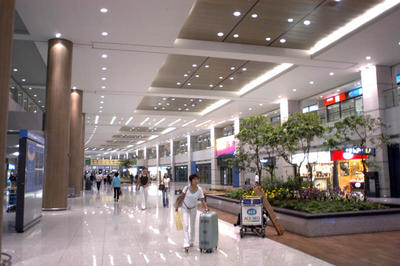

OK, everybody is just going to have to suck it up and forgive me for not updating. My computer died the day before I left for Korea. The "genius" at the Apple store told me I could have it back in seven to ten days. A lot can happen in that space of time. I could totally uproot my entire life and fly off to Korea to teach English for a year. Oh wait, what's this ticket in my hand?
I woke up Wednesday and checked my email one last time. Alex and Holly woke up with me to say goodbye. Alex lugged my suitcase to the door while I gave my cousin a hug. The last thing I ate in the States was an onion bagel covered in butter.
Another beautiful day in San Francisco flew by my seat on the BART train to SFO. I was on my own in a fashion I was completely unaccustomed to. Up until now I had never been anywhere my immediate family or friends could get to me without too much trouble. Even while I hiked the Appalachian Trail in 2003 I wasn't more than a $150 Airtran flight away from help. Korea is twelve hours away from Atlanta, exactly half the distance around the earth. No one was going to be able to come to my aid without a lot of hassle. My isolation sat in the seat next to me and put it's cold arm affectionatly around my shoulder.
I never thought I'd feel as much affection for a place I'd just visited as I felt for San Francisco at that moment. It is a beautiful, vibrant city with a full and rich character. However, my feelings for the city went beyond simple affection as I boarded the Boeing 777 bound for Seoul. It felt something like love, and that was strange.
For so long my regard for America has been rooted in hate and contempt. We're a preachy, ultra conservative, wasteful and flatly hipocritical people ignorant of the outside world. I took my seat and found my mouth dry as I realized my feelings for my country might have been a little one-sided. I still didn't know what to call this feeling as the 777 took to the sky and put the lush hills of San Francisco far away. I stayed glued to the window, watching the coast of California slip into the horizon.
The flight was long. Luckily the drinks were free and I sat next to a friendly Airforce serviceman named Hutch who kept me entertained. I finished my book, 1776, and worked on my Korean. The Korean speak Hangul, which is easy to learn relative to either Japanese or Chinese because it uses a phonetic system of writing. I picked up the entire alphabet and I could count to ten by the time the plane landed at Incheon.
I spent the next few hours in the pinball machine of the Korean transportation system, funneled, bounced and guided to my destination in Pusan. I called my folks at the Incheon airport and a friendly Canadian man helped me find the bus to the Korail station in Seoul, 40 miles away. Another couple helped me change my money to Korean Won. At around 1000 won to the dollar, the exchange rate wasn't bad.
I took the KTX high-speed train, number 99, to Pusan. A ticker on the television screen let me know how fast the train was going. At one point it displayed 300kph. I drifted in and out of sleep, periodically trying to get a glimpse of the Korean countryside. But the lights in the train made puncturing the darkness speeding by impossible.
At the train station in Pusan my roommate, Julie, picked me up with the other two teachers currently working at ESS Best Junior Academy, Dennis and Michael. We jumped into a cab. Julie turned to the driver. "Hangeegree, ma-pop," she said and the driver put the car in gear.
The city of Pusan pressed in on me, a towering cornicopia of billboard-infested skyscrapers shining brightly. Dennis and Julie gave my an earful about teaching at ESS, living in Pusan, and what to expect my first few weeks. Jet lag, crazy kids, spiteful Korean teachers danced in my head as we pulled up to my 20-story apartment. I had a drink with Julie and Dennis and then crashed in my bed, asleep before I hit the matress.
PART ONE OVER.
Subscribe to:
Posts (Atom)





